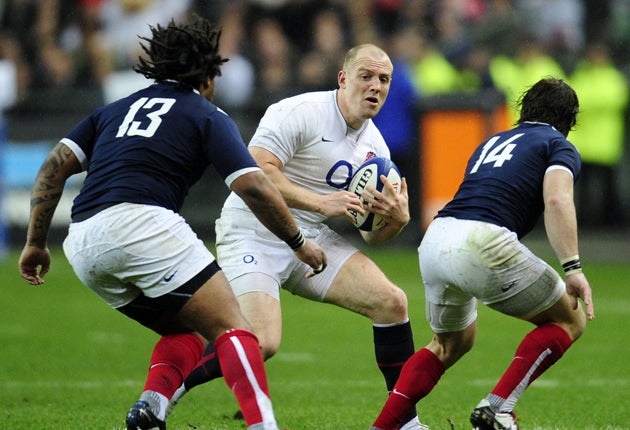Brian Ashton: Return of inspirational evergreen Tindall was a big plus for England
Tackling The Issues

While the Six Nations Championship is done and dusted for another year, done to death in some quarters, one certain aspect of the last weekend is well worth noting.
I have long advocated the importance of individuals contributing to the strength and positivity of a squad and a dressing room, and I consider the return of Mike Tindall to England's midfield to be a classic example.
Tindall is both an outstanding player and an outstanding individual, whose positive attitude to life and those around him is inspirational. He has the character and personality to transform a team, and the ability to coax the best out of young players with talent and the ambition to play at the highest level. You can rest assured that Ben Foden and Chris Ashton were the better for Tindall's presence in the lashing rain and toweringly tense atmosphere of Stade de France on Saturday night.
No surprise to learn that it was Tindall who put an arm around young Ashton afterwards and calmed him down when the Northampton wing admitted he feared his first cap would be his last after failing to make the best of two try-scoring opportunities.
It was wretched ill fortune that Tindall missed the 2007 World Cup because of a broken leg but, as with so many top-class players, injuries impact on careers. So seeing him back in harness for England at a time when young bloods are surfacing and getting their opportunities, is a very positive element for the national game.
Tindall, who is often regarded as one-dimensional, has an ability to read the game in the wider channels and has shrewd awareness of space that makes him a tremendous asset to any team.
So, with France claiming their third Grand Slam in eight years, the Six Nations ended on 20 March, creating the possibility that anticlimax would be the inevitable progression. Not so.
On 21 March Northampton beat Gloucester in the LV= Cup final, staged at Worcester's Sixways Stadium, and an excellent advertisement for positive, attacking club rugby.
Northampton, under the guidance of their forward-looking coaching triumvirate Jim Mallinder, Dorian West and Paul Grayson, lifted the trophy despite the fact that Dylan Hartley, Foden and Ashton were with the England squad. They edged out a rejuvenated Gloucester in a cracking spectacle – and I wonder what the chances are of us seeing the same when the Guinness Premiership returns this weekend.
Mind you, there was an entertainment of sorts after the Six Nations as the rumour mill went into overdrive, and the inevitable criticism was delivered from various quarters, particular the really brave unnamed "sources", hiding behind their parapets and enjoying their 15 minutes of dubious fame. Where would our game be without our unnamed "sources"? Discuss
I then attended the National School Sevens at Rosslyn Park, turning the clock back to my schoolteaching days, and was delighted to watch boys from Under-13s upwards displaying good techniques, intelligent decision-making and maintaining the tempo in the demanding Sevens arena. Full marks to the players and to their teaching staff because it was a hugely encouraging and enjoyable experience.
And it got me thinking as I drove home. We'll see Sevens rugby introduced into the 2016 Olympic Games, and I wonder how many young players will accept the opportunity to go down the professional Sevens road as opposed to playing the XV-a-side game?
The modern specialised professional Sevens game takes players to exotic venues and will soon offer them the opportunity of competing for Olympic gold. They could bypass altogether the more physically draining full version of rugby union, something we see happening a lot in New Zealand, Australia and South Africa, where the majority of their Sevens international players do not figure in the regular Test squads.
The unfettered freedom you see in abundance displayed by young players in Sevens is exhilarating. Compare that with the more complicated XVs game, where the more structured, science-based coaching now tends to dominate.
How much would that environment affect the freedom enjoyed by these players? How much would it inhibit that freedom from remaining and flourishing as their game develops?
It is always both exciting and enjoyable to watch talent blossoming unheeded, to see young players revelling in the sheer joy of their game. Sevens offers far more opportunity for that degree of self-expression to thrive.
Subscribe to Independent Premium to bookmark this article
Want to bookmark your favourite articles and stories to read or reference later? Start your Independent Premium subscription today.

Join our commenting forum
Join thought-provoking conversations, follow other Independent readers and see their replies